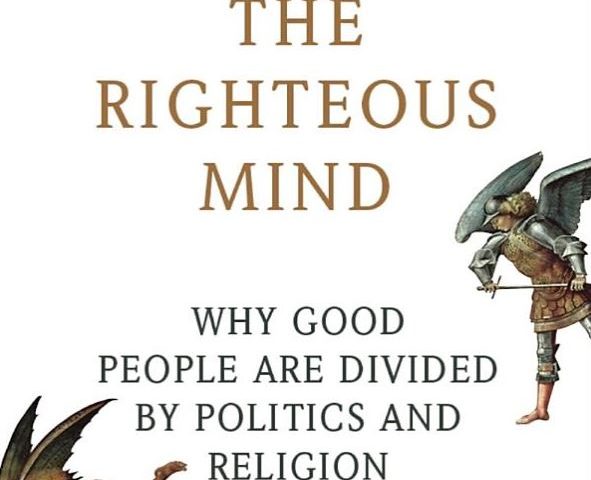The BEST: The Righteous Mind: Why Good People Are Divided by Politics and Religion

The BEST
Jonathan Haidt, The Righteous Mind: Why Good People Are Divided by Politics and Religion
Rafi Eis
Summary: Haidt explains why we fight over religion and politics. Our disagreements stem from different intuitions about right and wrong. He lists six moral axes that people use to define what is good and bad: 1) care/harm, 2) liberty/oppression, 3) fairness/cheating, 4) loyalty/betrayal, 5) authority/subversion, 6) sanctity/degradation. A person or society’s moral thinking may contain one or more of these axes. Seeing morality along one axis, a person may not be aware that other axes exist, becoming frustrated by the seemingly unreasonable opposition of those with different moral instincts. As an example, the debate over expanding government’s role in healthcare is really a function of the gap between the care/harm axis and the freedom/oppression axis. More people might have access to health coverage (which increase care) but at the cost of higher taxes and additional rules about the type of insurance individuals must buy (which limits freedom).
A progressive thinks morally along the care/harm axis, a libertarian on the liberty/oppression axis, a social conservative attempts to balance these axes. Haidt argues that conservatives have a more sophisticated moral palate. The imbalanced focus that progressives and libertarians give to care/harm and liberty/oppression respectively are uniquely found in Western Educated Industrial Rich and Democratic (WEIRD) societies. Peoples in other places and times have balanced more moral axes. Haidt concludes the book by pointing out that the last three moral axes (loyalty/betrayal, authority/subversion, and sanctity/degradation) are the critical ingredients for creating communal unity and that they are reflected in particular rituals that define cultures.
Message: Defining the underlying assumptions of morality will enable us to have better conversations with those with whom we disagree (listen to this discussion here).
Consumption Time: 530 pages – c. 1,000 minutes ~ 16.5 hours
Cautionary Instructions: Haidt presents religion in evolutionary terms.
Why this is the BEST: The rapid pace of cultural and technological change poses two challenges to religious leaders. First, these changes purport to create a more caring world. Rejection of an innovation, therefore, opens up religion to the critique of being harmful and cruel. Acceptance on the other hand, allows the outside world to dictate the direction of the religious community.
This leads to the second challenge. Whether a community accepts or rejects these changes often divides the religious community. If accepted, the suffering of some will be relieved, but other communal members will feel that the changes violate authentic religious values and will break away. If rejected, the suffering of a person will continue and the sufferer and the sufferer’s supporters will break away.
These challenges require identifying the underlying moral axis of the proponent and then explaining and defending a different moral axis, in response. How the Orthodox community relates to LGBTQ+ individuals serves as a good example. Anything short of full validation rejects the suffering individual’s identity and causes emotional harm. Endorsement, on the other hand, violates the authority of the Torah and the sanctity that it asks us to uphold. Euthanasia is another example. Euthanasia is defended based on human dignity (to experience indignity is a form of harm) and liberty. Euthanasia is attacked based on the sanctity of human life.
The Orthodox community can defend itself against the charge that the Torah is immoral by more clearly explaining the axes along which its moral instincts lay. The Torah does not reject the care/harm or the liberty/oppression axes, but it balances them against other moral concerns (fairness/cheating, loyalty/betrayal, authority/subversion, and most especially sanctity/degradation). The Torah guides us on how to best balance these moral axes when they come into conflict.
Conducting debates with an awareness of one’s own moral instincts enables greater understanding by each side. Informed disagreements lead to more complex understandings of the world and avoid the condescending moral judgment that is so common in today’s discourse.
Rabbi Rafi Eis is the Executive Director at the Herzl Institute.
This is the sixth installment in TraditionOnline’s “The BEST” column, exploring exemplars of the best culture has to offer thinking religious people — click here for the series introduction.
Published August 23, 2019
